Detailed Business Law Assignment: Contract Law Analysis & Cases
VerifiedAdded on 2023/01/23
|7
|1146
|65
Homework Assignment
AI Summary
This business law assignment delves into key concepts of contract law, analyzing cases and legal principles. It addresses the Ermogenous v Greek Orthodox Community case, exploring the shift from presumption to objective tests for determining contractual intent. The assignment examines clauses regarding intention to create legal relations, and dispute resolution. It further analyzes issues of consideration, including part payment and promissory estoppel, as seen in cases such as Hirachand Punamchand v Temple. The assignment also tackles the significance of consideration, as exemplified in Ward v Byham, and exclusion clauses, referencing Hollier V Rambler Motors. Furthermore, it discusses the distinction between statements and representations, and explores the concept of implied terms within contracts. Finally, the assignment considers the implications of the Goods Act 1958 (Vic), concerning the quality of goods supplied. The assignment covers a range of topics to provide a detailed overview of contract law.
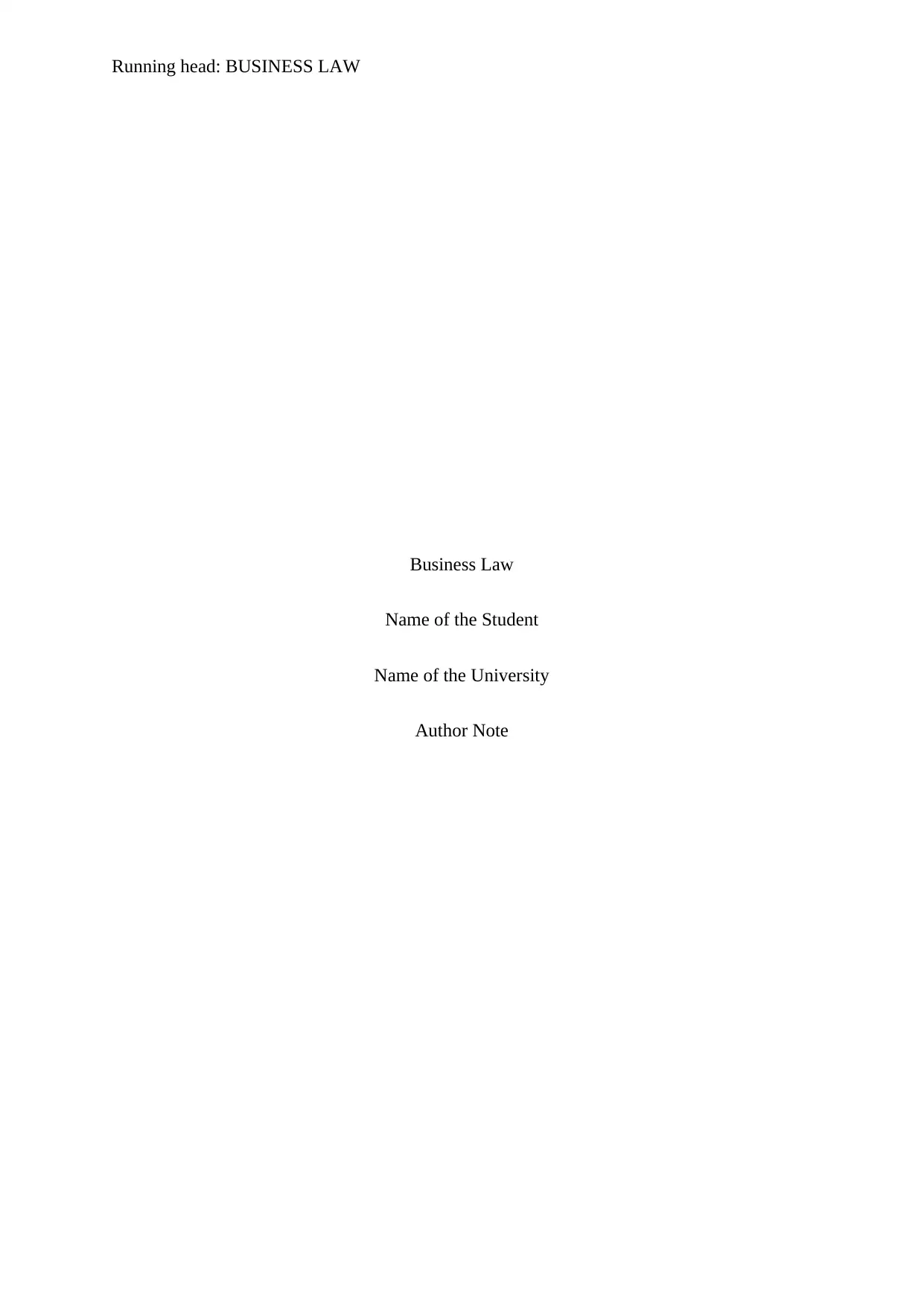
Running head: BUSINESS LAW
Business Law
Name of the Student
Name of the University
Author Note
Business Law
Name of the Student
Name of the University
Author Note
Paraphrase This Document
Need a fresh take? Get an instant paraphrase of this document with our AI Paraphraser
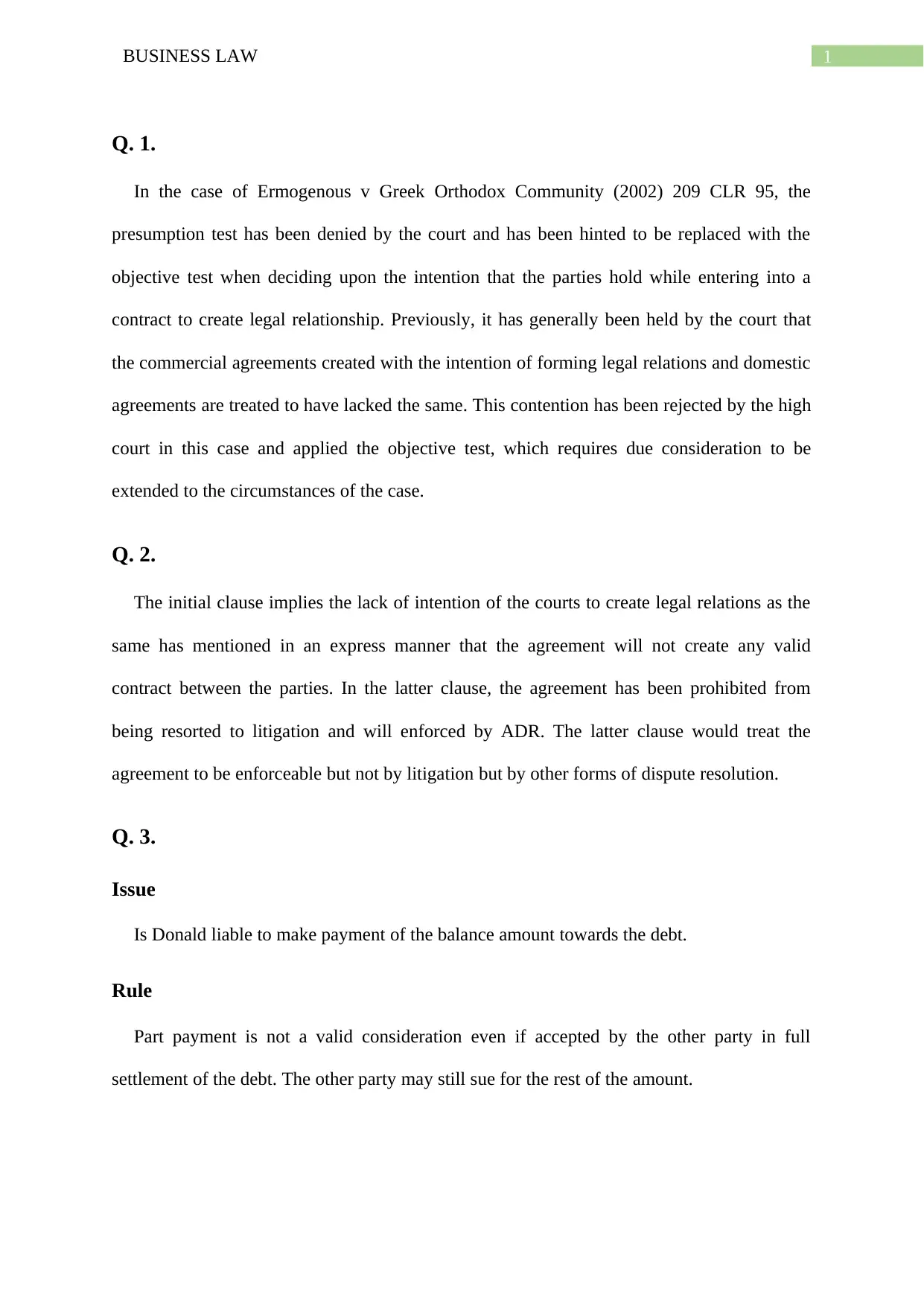
1BUSINESS LAW
Q. 1.
In the case of Ermogenous v Greek Orthodox Community (2002) 209 CLR 95, the
presumption test has been denied by the court and has been hinted to be replaced with the
objective test when deciding upon the intention that the parties hold while entering into a
contract to create legal relationship. Previously, it has generally been held by the court that
the commercial agreements created with the intention of forming legal relations and domestic
agreements are treated to have lacked the same. This contention has been rejected by the high
court in this case and applied the objective test, which requires due consideration to be
extended to the circumstances of the case.
Q. 2.
The initial clause implies the lack of intention of the courts to create legal relations as the
same has mentioned in an express manner that the agreement will not create any valid
contract between the parties. In the latter clause, the agreement has been prohibited from
being resorted to litigation and will enforced by ADR. The latter clause would treat the
agreement to be enforceable but not by litigation but by other forms of dispute resolution.
Q. 3.
Issue
Is Donald liable to make payment of the balance amount towards the debt.
Rule
Part payment is not a valid consideration even if accepted by the other party in full
settlement of the debt. The other party may still sue for the rest of the amount.
Q. 1.
In the case of Ermogenous v Greek Orthodox Community (2002) 209 CLR 95, the
presumption test has been denied by the court and has been hinted to be replaced with the
objective test when deciding upon the intention that the parties hold while entering into a
contract to create legal relationship. Previously, it has generally been held by the court that
the commercial agreements created with the intention of forming legal relations and domestic
agreements are treated to have lacked the same. This contention has been rejected by the high
court in this case and applied the objective test, which requires due consideration to be
extended to the circumstances of the case.
Q. 2.
The initial clause implies the lack of intention of the courts to create legal relations as the
same has mentioned in an express manner that the agreement will not create any valid
contract between the parties. In the latter clause, the agreement has been prohibited from
being resorted to litigation and will enforced by ADR. The latter clause would treat the
agreement to be enforceable but not by litigation but by other forms of dispute resolution.
Q. 3.
Issue
Is Donald liable to make payment of the balance amount towards the debt.
Rule
Part payment is not a valid consideration even if accepted by the other party in full
settlement of the debt. The other party may still sue for the rest of the amount.
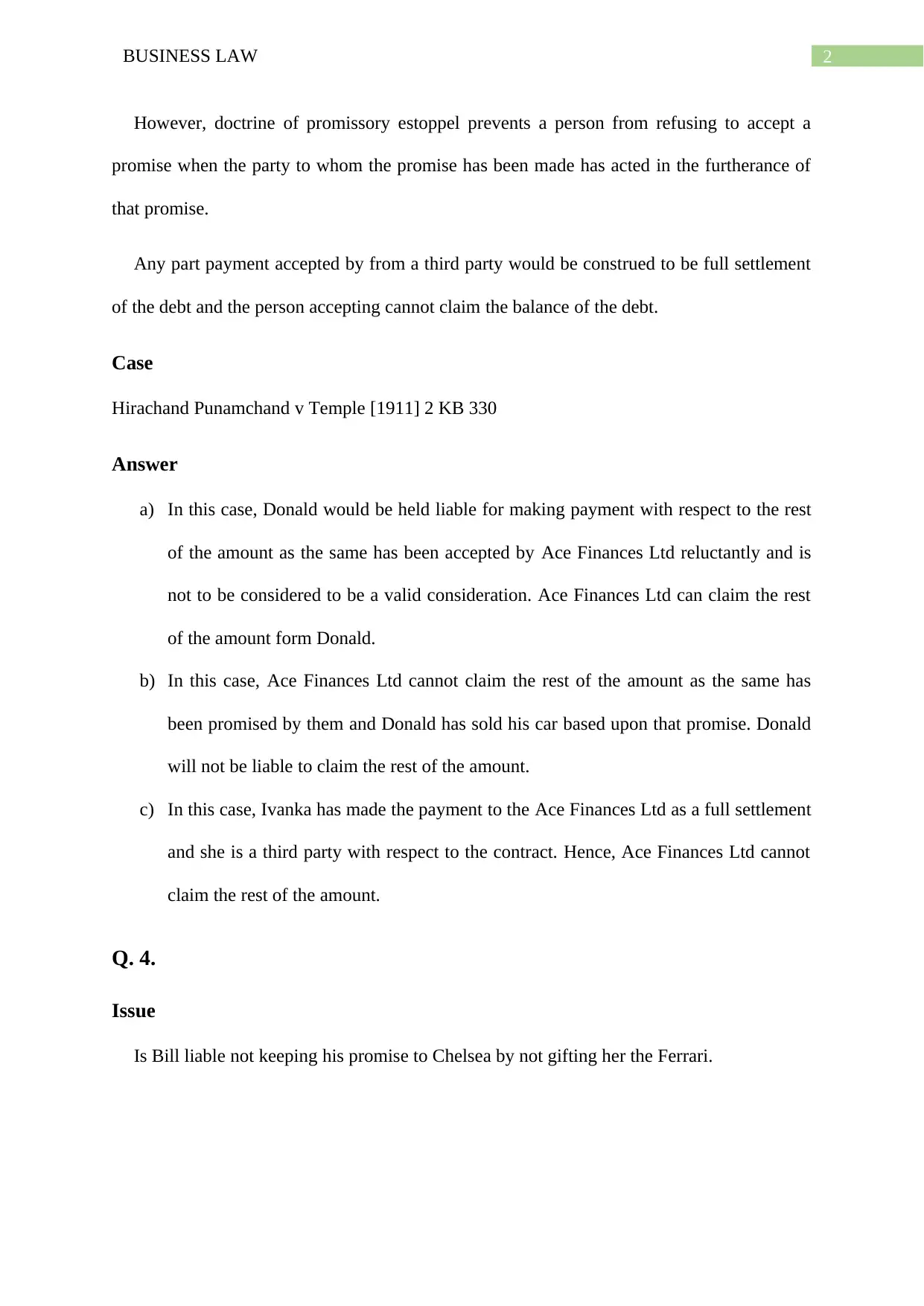
2BUSINESS LAW
However, doctrine of promissory estoppel prevents a person from refusing to accept a
promise when the party to whom the promise has been made has acted in the furtherance of
that promise.
Any part payment accepted by from a third party would be construed to be full settlement
of the debt and the person accepting cannot claim the balance of the debt.
Case
Hirachand Punamchand v Temple [1911] 2 KB 330
Answer
a) In this case, Donald would be held liable for making payment with respect to the rest
of the amount as the same has been accepted by Ace Finances Ltd reluctantly and is
not to be considered to be a valid consideration. Ace Finances Ltd can claim the rest
of the amount form Donald.
b) In this case, Ace Finances Ltd cannot claim the rest of the amount as the same has
been promised by them and Donald has sold his car based upon that promise. Donald
will not be liable to claim the rest of the amount.
c) In this case, Ivanka has made the payment to the Ace Finances Ltd as a full settlement
and she is a third party with respect to the contract. Hence, Ace Finances Ltd cannot
claim the rest of the amount.
Q. 4.
Issue
Is Bill liable not keeping his promise to Chelsea by not gifting her the Ferrari.
However, doctrine of promissory estoppel prevents a person from refusing to accept a
promise when the party to whom the promise has been made has acted in the furtherance of
that promise.
Any part payment accepted by from a third party would be construed to be full settlement
of the debt and the person accepting cannot claim the balance of the debt.
Case
Hirachand Punamchand v Temple [1911] 2 KB 330
Answer
a) In this case, Donald would be held liable for making payment with respect to the rest
of the amount as the same has been accepted by Ace Finances Ltd reluctantly and is
not to be considered to be a valid consideration. Ace Finances Ltd can claim the rest
of the amount form Donald.
b) In this case, Ace Finances Ltd cannot claim the rest of the amount as the same has
been promised by them and Donald has sold his car based upon that promise. Donald
will not be liable to claim the rest of the amount.
c) In this case, Ivanka has made the payment to the Ace Finances Ltd as a full settlement
and she is a third party with respect to the contract. Hence, Ace Finances Ltd cannot
claim the rest of the amount.
Q. 4.
Issue
Is Bill liable not keeping his promise to Chelsea by not gifting her the Ferrari.
⊘ This is a preview!⊘
Do you want full access?
Subscribe today to unlock all pages.

Trusted by 1+ million students worldwide
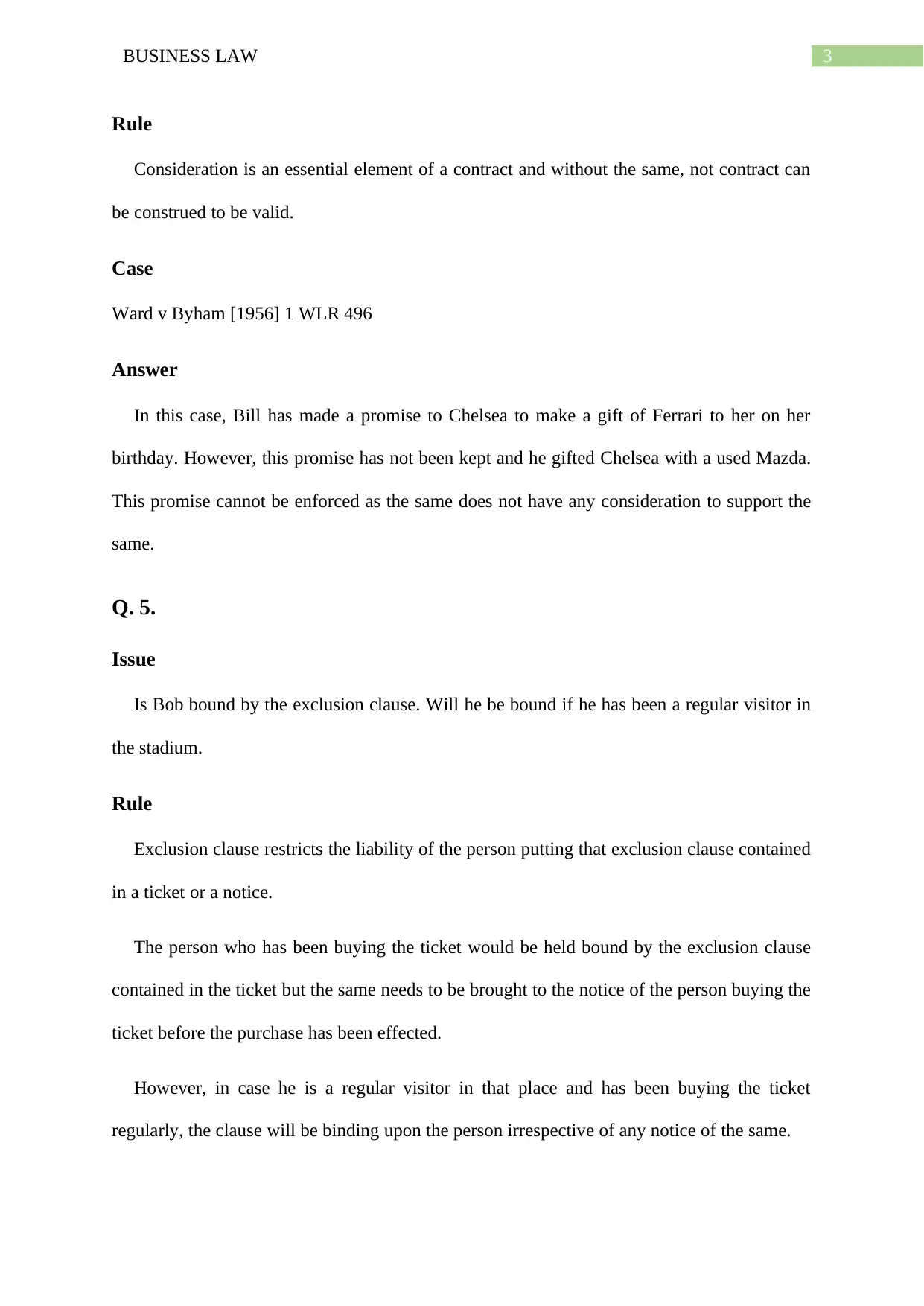
3BUSINESS LAW
Rule
Consideration is an essential element of a contract and without the same, not contract can
be construed to be valid.
Case
Ward v Byham [1956] 1 WLR 496
Answer
In this case, Bill has made a promise to Chelsea to make a gift of Ferrari to her on her
birthday. However, this promise has not been kept and he gifted Chelsea with a used Mazda.
This promise cannot be enforced as the same does not have any consideration to support the
same.
Q. 5.
Issue
Is Bob bound by the exclusion clause. Will he be bound if he has been a regular visitor in
the stadium.
Rule
Exclusion clause restricts the liability of the person putting that exclusion clause contained
in a ticket or a notice.
The person who has been buying the ticket would be held bound by the exclusion clause
contained in the ticket but the same needs to be brought to the notice of the person buying the
ticket before the purchase has been effected.
However, in case he is a regular visitor in that place and has been buying the ticket
regularly, the clause will be binding upon the person irrespective of any notice of the same.
Rule
Consideration is an essential element of a contract and without the same, not contract can
be construed to be valid.
Case
Ward v Byham [1956] 1 WLR 496
Answer
In this case, Bill has made a promise to Chelsea to make a gift of Ferrari to her on her
birthday. However, this promise has not been kept and he gifted Chelsea with a used Mazda.
This promise cannot be enforced as the same does not have any consideration to support the
same.
Q. 5.
Issue
Is Bob bound by the exclusion clause. Will he be bound if he has been a regular visitor in
the stadium.
Rule
Exclusion clause restricts the liability of the person putting that exclusion clause contained
in a ticket or a notice.
The person who has been buying the ticket would be held bound by the exclusion clause
contained in the ticket but the same needs to be brought to the notice of the person buying the
ticket before the purchase has been effected.
However, in case he is a regular visitor in that place and has been buying the ticket
regularly, the clause will be binding upon the person irrespective of any notice of the same.
Paraphrase This Document
Need a fresh take? Get an instant paraphrase of this document with our AI Paraphraser
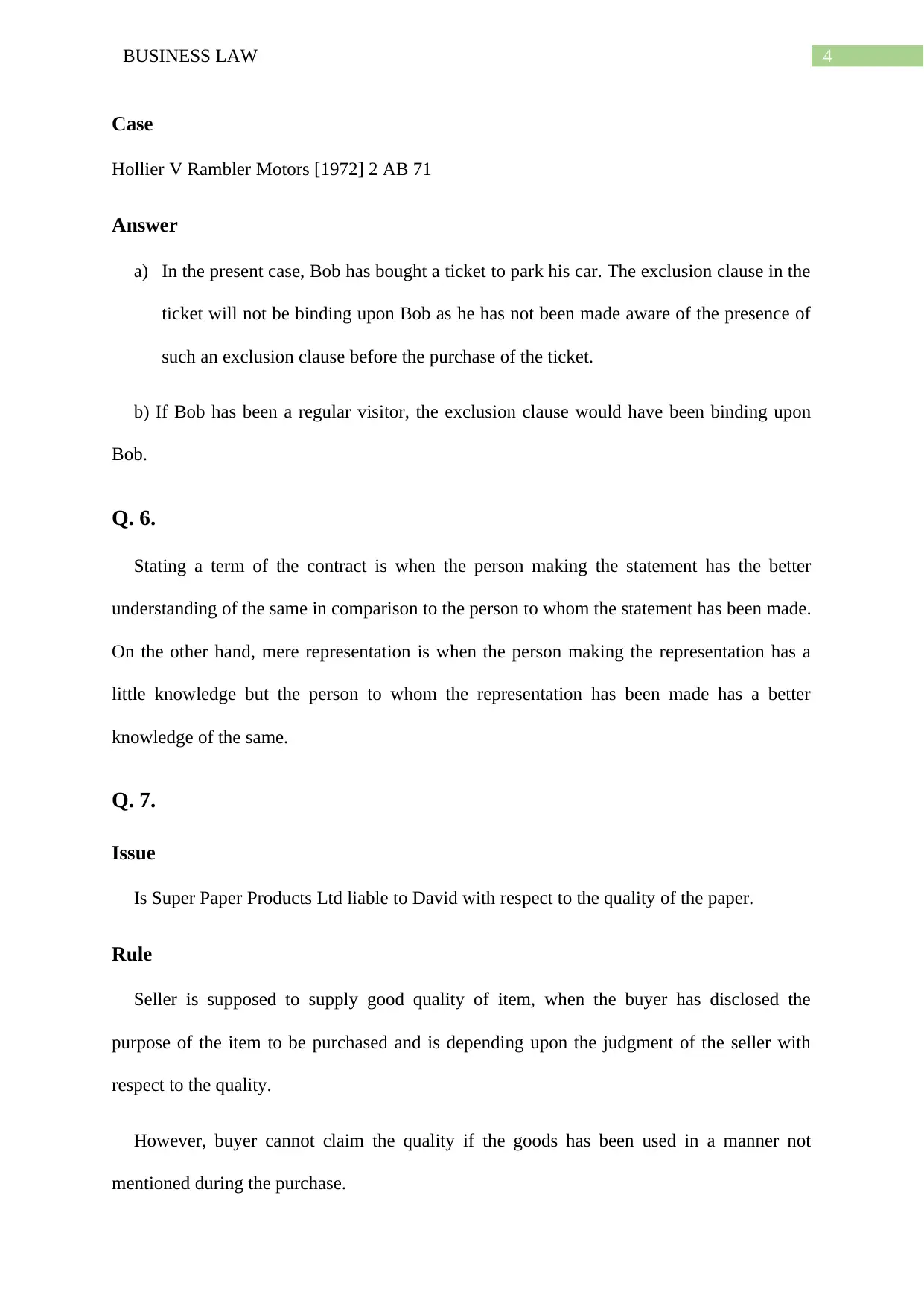
4BUSINESS LAW
Case
Hollier V Rambler Motors [1972] 2 AB 71
Answer
a) In the present case, Bob has bought a ticket to park his car. The exclusion clause in the
ticket will not be binding upon Bob as he has not been made aware of the presence of
such an exclusion clause before the purchase of the ticket.
b) If Bob has been a regular visitor, the exclusion clause would have been binding upon
Bob.
Q. 6.
Stating a term of the contract is when the person making the statement has the better
understanding of the same in comparison to the person to whom the statement has been made.
On the other hand, mere representation is when the person making the representation has a
little knowledge but the person to whom the representation has been made has a better
knowledge of the same.
Q. 7.
Issue
Is Super Paper Products Ltd liable to David with respect to the quality of the paper.
Rule
Seller is supposed to supply good quality of item, when the buyer has disclosed the
purpose of the item to be purchased and is depending upon the judgment of the seller with
respect to the quality.
However, buyer cannot claim the quality if the goods has been used in a manner not
mentioned during the purchase.
Case
Hollier V Rambler Motors [1972] 2 AB 71
Answer
a) In the present case, Bob has bought a ticket to park his car. The exclusion clause in the
ticket will not be binding upon Bob as he has not been made aware of the presence of
such an exclusion clause before the purchase of the ticket.
b) If Bob has been a regular visitor, the exclusion clause would have been binding upon
Bob.
Q. 6.
Stating a term of the contract is when the person making the statement has the better
understanding of the same in comparison to the person to whom the statement has been made.
On the other hand, mere representation is when the person making the representation has a
little knowledge but the person to whom the representation has been made has a better
knowledge of the same.
Q. 7.
Issue
Is Super Paper Products Ltd liable to David with respect to the quality of the paper.
Rule
Seller is supposed to supply good quality of item, when the buyer has disclosed the
purpose of the item to be purchased and is depending upon the judgment of the seller with
respect to the quality.
However, buyer cannot claim the quality if the goods has been used in a manner not
mentioned during the purchase.
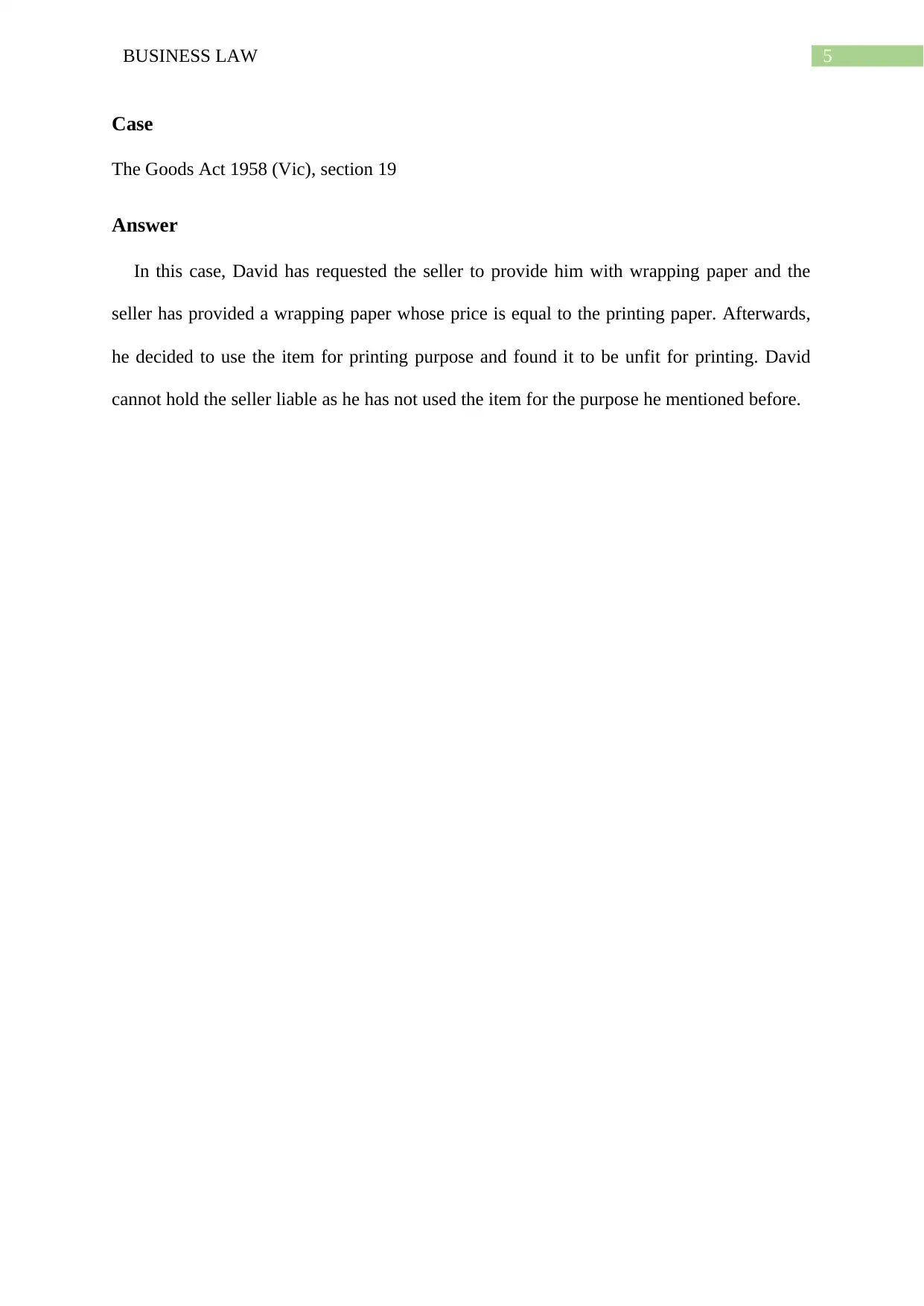
5BUSINESS LAW
Case
The Goods Act 1958 (Vic), section 19
Answer
In this case, David has requested the seller to provide him with wrapping paper and the
seller has provided a wrapping paper whose price is equal to the printing paper. Afterwards,
he decided to use the item for printing purpose and found it to be unfit for printing. David
cannot hold the seller liable as he has not used the item for the purpose he mentioned before.
Case
The Goods Act 1958 (Vic), section 19
Answer
In this case, David has requested the seller to provide him with wrapping paper and the
seller has provided a wrapping paper whose price is equal to the printing paper. Afterwards,
he decided to use the item for printing purpose and found it to be unfit for printing. David
cannot hold the seller liable as he has not used the item for the purpose he mentioned before.
⊘ This is a preview!⊘
Do you want full access?
Subscribe today to unlock all pages.

Trusted by 1+ million students worldwide
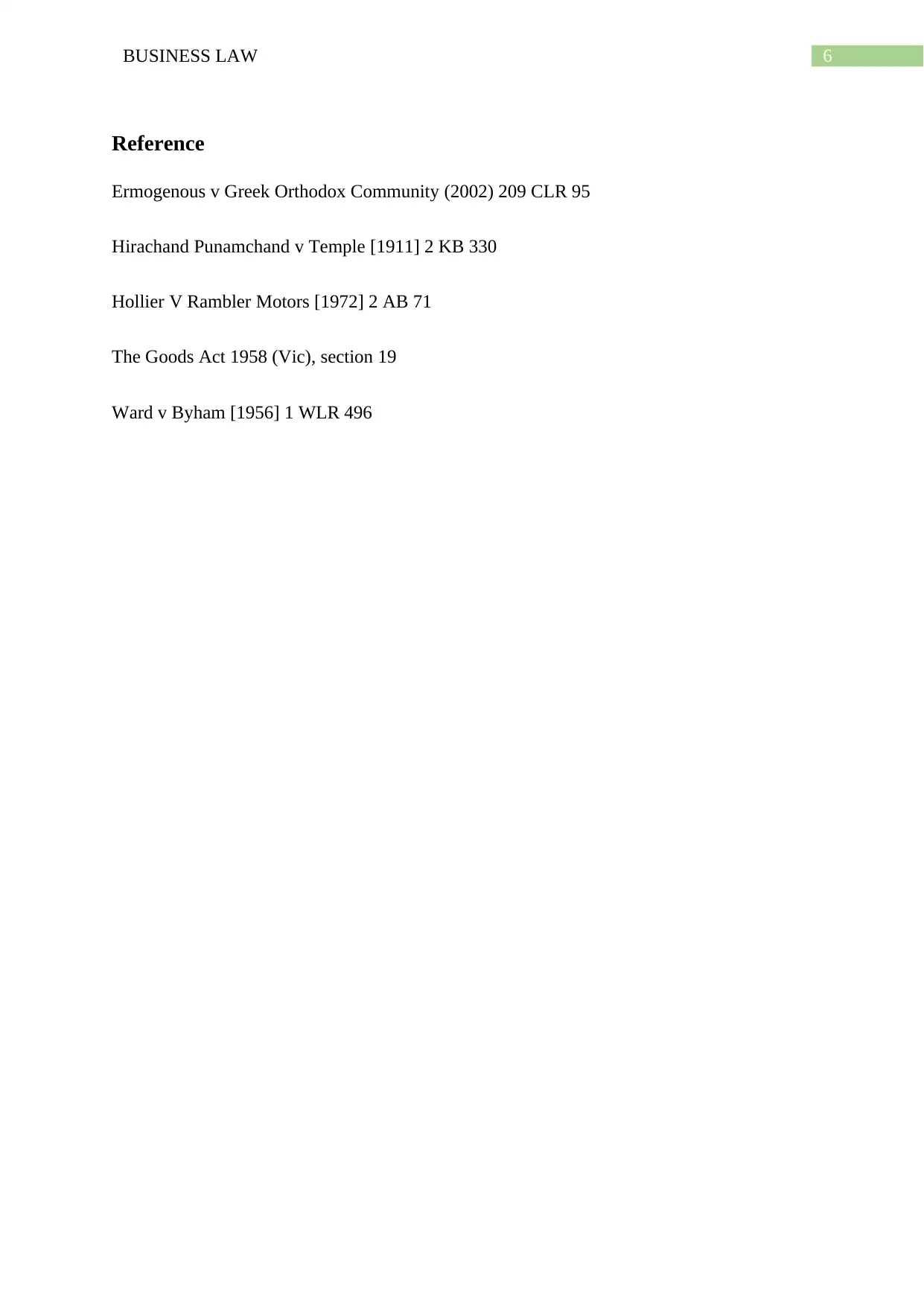
6BUSINESS LAW
Reference
Ermogenous v Greek Orthodox Community (2002) 209 CLR 95
Hirachand Punamchand v Temple [1911] 2 KB 330
Hollier V Rambler Motors [1972] 2 AB 71
The Goods Act 1958 (Vic), section 19
Ward v Byham [1956] 1 WLR 496
Reference
Ermogenous v Greek Orthodox Community (2002) 209 CLR 95
Hirachand Punamchand v Temple [1911] 2 KB 330
Hollier V Rambler Motors [1972] 2 AB 71
The Goods Act 1958 (Vic), section 19
Ward v Byham [1956] 1 WLR 496
1 out of 7
Related Documents
Your All-in-One AI-Powered Toolkit for Academic Success.
+13062052269
info@desklib.com
Available 24*7 on WhatsApp / Email
![[object Object]](/_next/static/media/star-bottom.7253800d.svg)
Unlock your academic potential
Copyright © 2020–2026 A2Z Services. All Rights Reserved. Developed and managed by ZUCOL.




